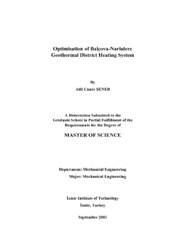Please use this identifier to cite or link to this item:
https://hdl.handle.net/11147/3121Full metadata record
| DC Field | Value | Language |
|---|---|---|
| dc.contributor.advisor | Gökçen Akkurt, Gülden | en |
| dc.contributor.author | Şener, Adil Caner | - |
| dc.date.accessioned | 2014-07-22T13:50:54Z | - |
| dc.date.available | 2014-07-22T13:50:54Z | - |
| dc.date.issued | 2003 | en |
| dc.identifier.uri | http://hdl.handle.net/11147/3121 | - |
| dc.description | Thesis (Master)--Izmir Institute of Technology, Mechanical Engineering, Izmir, 2003 | en |
| dc.description | Includes bibliographical references (leaves: 118-121) | en |
| dc.description | Text in English; Abstract: Turkish and English | en |
| dc.description | xiv, 121 leaves | en |
| dc.description.abstract | The main goal of this study is to determine optimum control strategy of Balçova-Narlıdere geothermal district heating system to minimise the energy consumption. First heat demand model of the system was constructed by using statistical method called time series analysis. This model provides the heat demand forecast of next day, by considering ambient temperature forecast of the next day. Then geothermal pipeline system and city distribution system have been modelled in the PIPELAB district heating simulation program. To model the system close to the actual case, database of Balçova geothermal company was used as an input, and the code of PIPELAB program was adapted to be used in geothermal pipeline system. Once the sysem was modelled in PIPELAB, it would be possible to obtain pressure and temperature distribution along the pipe networks in the system. To determine the optimum operation strategy of the wells according to the changing heat demand first the energy consumption of each well pump was defined as a function of their heat production rate. Then these functions were inserted into dynamic programming algorithm which selects the optimum well operation strategy among thousands of options. Also power consumption models of circulation pumps were built and calibrated with actual values. Finally optimum control strategy for the system was determined and the system model was operated by using optimum control strategy according to ambient temperature data of 2001 and 2002. The acual energy consumption values were compared with the optimum energy consumption values and decisive factors in efficient control and operation of the system have been defined. | en |
| dc.language.iso | en | en_US |
| dc.publisher | Izmir Institute of Technology | en |
| dc.rights | info:eu-repo/semantics/openAccess | en_US |
| dc.subject.lcc | TJ280.7.S46 2003 | en |
| dc.subject.lcsh | Geothermal engineering | en |
| dc.subject.lcsh | Geothermal district heating | en |
| dc.subject.lcsh | Geothermal resources--Turkey | en |
| dc.title | Optimisation of Balçova-Narlıdere geothermal district heating system | en_US |
| dc.type | Master Thesis | en_US |
| dc.institutionauthor | Şener, Adil Caner | - |
| dc.department | Thesis (Master)--İzmir Institute of Technology, Mechanical Engineering | en_US |
| dc.relation.publicationcategory | Tez | en_US |
| item.fulltext | With Fulltext | - |
| item.grantfulltext | open | - |
| item.languageiso639-1 | en | - |
| item.openairecristype | http://purl.org/coar/resource_type/c_18cf | - |
| item.cerifentitytype | Publications | - |
| item.openairetype | Master Thesis | - |
| Appears in Collections: | Master Degree / Yüksek Lisans Tezleri | |
Files in This Item:
| File | Description | Size | Format | |
|---|---|---|---|---|
| T000245.pdf | MasterThesis | 1.95 MB | Adobe PDF |  View/Open |
CORE Recommender
Page view(s)
306
checked on Nov 18, 2024
Download(s)
118
checked on Nov 18, 2024
Google ScholarTM
Check
Items in GCRIS Repository are protected by copyright, with all rights reserved, unless otherwise indicated.